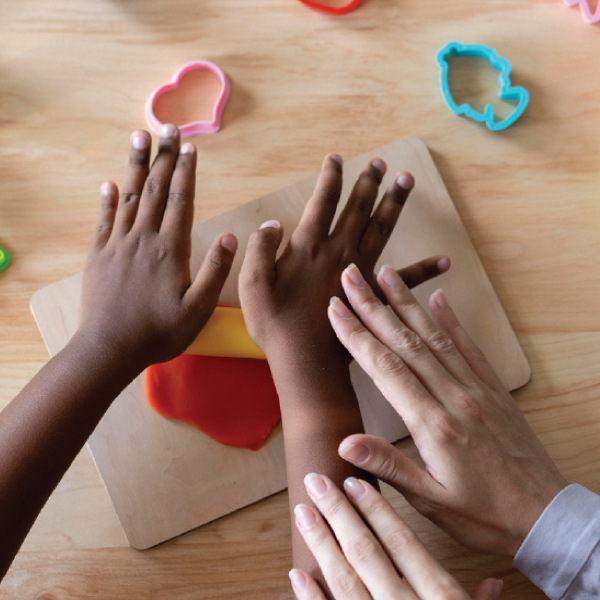
Occupational / Physical Therapy Resources
CESA 6 Occupational Therapists and Physical Therapists specialize in working with children in special education. They provide flexible, convenient, and cost-effective staffing to meet students’ needs.
Our OT specialists evaluate students' functional skills including self-care, fine-motor, and academic skills to improve the child's performance in the classroom. Students can also benefit from our PT services to assess their functional motor skills and help them adapt to their classroom environment, improving their self-confidence and independence.

OT/PT Resources
Our goal is to give students and their families the resources they need to succeed. We have compiled lists of activities and skills that students can focus on with their teachers and parents to help them grow in and outside of the classroom.
Balance
The ability to remain upright when moving the entire body or shifting weight to move and reach for needed items throughout the day. Static balance is the ability to hold the body in a specific position while dynamic balance is the ability to maintain balance while the body is in motion.
Learn MoreExecutive Functioning
Executive functioning is a term used to describe the many tasks one’s brain performs that are necessary to think, act, and solve problems. Executive functioning includes tasks that help us learn new information, remember and retrieve information we’ve learned in the past, and use this information to solve problems of everyday life. A child’s executive function skills make it possible for him or her to function in a manner consistent with the child’s age.
Executive function is a set of mental skills that include working memory, flexible thinking, and self-control. We use these skills every day to learn, work, and manage daily life. Trouble with executive function can make it hard to focus, follow directions, and handle emotions, among other things.
Fine Motor Strength & Skills
Fine motor skills involve the use of precise and coordinated movements of the fingers to perform hand use tasks. Fine motor skills are necessary for completing daily tasks such as dressing (using buttons/zippers), feeding (using mealtime utensils), being a student (using a pencil, keyboard, or scissors), and leisure/play activities (drawing, playing many musical instruments).
Learn MoreFun Activities
Playing is one of the most important things you can do with your child, because play is essential for your child’s brain development. The time you spend playing together gives your child lots of different ways and times to learn.
Learn MoreLocomotor
These skills allow students to move through different environments, moving their bodies from one location to another. See how it impacts their function in the school environment.
Learn MorePositioning
Providing appropriate seating/positioning options can allow students to focus in class, support necessary balance and movement skills, and provide good posture for reading and writing in the classroom.
Learn MorePre-Writing & Handwriting
Pre-writing skills are the fundamental skills children need to develop before they are able to write. These skills contribute to the child’s ability to hold and use a pencil, and the ability to draw, write, copy, and color.
A major component of pre-writing skills are the pre-writing shapes. These are the pencil strokes that most letters, numbers, and early drawings are composed of. They are typically mastered in sequential order, and to an age-specific level.
Self-Regulation Skills
Self-regulation assists students in managing their thoughts, behaviors, and emotions in order to successfully manage their learning experiences.
Learn MoreSensory Activities
Our sensory system allows us to understand the world around us. These sensory activities aim to stimulate children's senses in multiple ways to engage them and support their learning and development.
Learn MoreStair Climbing
The ability to safely walk up/down stairs within the school environment as well as navigate playground equipment stairs is a daily necessity for students in our schools.
Learn MoreVisual Perceptual & Visual Motor Handwriting
Visual Perception is the vision skills needed to understand, evaluate, and interpret what is seen. This impacts activities like using scissors, solving puzzles, and copying drawn objects.
Learn MoreOT/PT Family Tools & Resources
See what skills you can practice at home with these simple tools and activities.
Success Stories


We really enjoyed (our coach) and her work....this is important work for the entire team.
The coaching sessions helped me realize things about my own leadership and helped me see different ways of approaching challenging conversations.
1 of 2
Helpful Resources

Tailored Evaluation and Coaching for Professional Growth
-
Understand the Challenge
Begin your educator effectiveness journey with CESA 6 through a complimentary virtual session, where our specialists dive into identifying your professional development needs.
-
Choose the Path
Following a thorough assessment of your needs, CESA 6 presents various customized options like innovative coaching opportunities to support your team’s professional goals.
-
Implement the Solution
CESA 6 stands by your side as you implement the chosen solution, initiating detailed training and continuous support structures. Our commitment to regular monitoring and adaptive feedback ensures that your professional development aligns with your needs.







